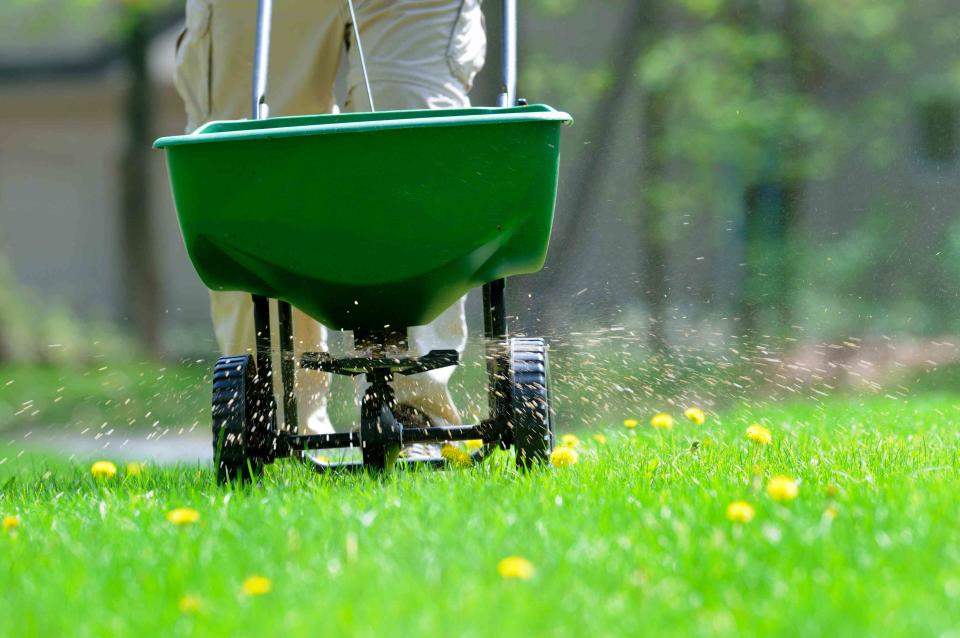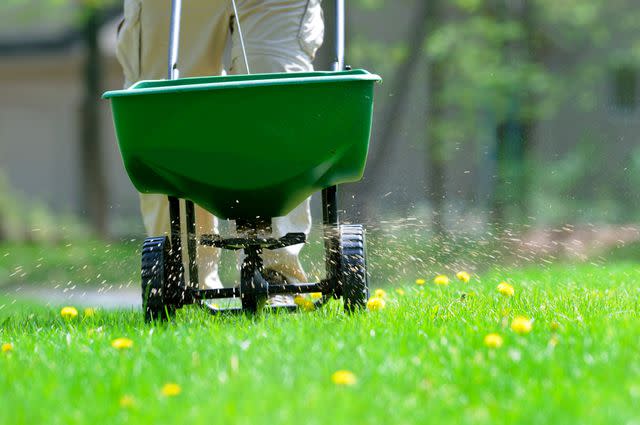What Is Grass Fertilizer Burn? Plus 5 Tips to Prevent It
Yellow or brown patches of lawn could be grass fertilizer burn.

groveb/ Getty Images
Turf grass fertilizer can help keep your lawn healthy when applied correctly. However, too much of a good thing may result in grass fertilizer burn. Excess fertilizer can kill your grass, and is also harmful to soil microbes, the water supply, and nearby wildlife. Prevent grass fertilizer burn with these simple strategies. If you overapplied fertilizer, you'll find tips to help save your lawn and what to do if your grass is already damaged.

groveb/ Getty Images
Related: 12 Fall Lawn Care Secrets for Healthy Grass in the Spring
How can fertilizer burn grass?
Many lawn fertilizer products contain valuable salts in addition to nutrients. The salts in a fertilizer combination make nutrients available to plants quickly, which results in fast greening up of turf grass. Fertilizer burn happens when the fertilizer product is overapplied and the salts disrupt the soil makeup. The excessive salts quickly seep into the soil and surround the plant roots, preventing them from taking up water and, in some cases, also preventing plant cells from getting rid of waste. Soon a toxic environment develops, and the grass quickly dies.
Lawn fertilizers labeled “slow-release” contain few salts and are less likely to burn turf grass if misapplied. Many natural and organic fertilizer products also contain few salts, making them less likely to cause fertilizer burn. Always read fertilizer application directions carefully and apply the product exactly according to the instructions.
Related: The 9 Best Organic Lawn Fertilizers of 2023
How to Fix Fertilizer Burn on Grass
If you suspect fertilizer burn, your main goal is to pick up as much of the fertilizer product as possible. Then soak the soil where the overapplication occurred to move the harmful salts through the soil profile and away from plant roots.
For fertilizer spills, use a rake or shop vacuum to pick up fertilizer pellets if possible. Some grass will be damaged in the process, but the damage will be less than if the fertilizer is allowed to remain in place. Use a lawn sprinkler to soak the soil thoroughly, which will wash the fertilizer deep into the soil.
If your first indication of grass fertilizer burn is brown strips of turf or a large patch where fertilizer was likely spilled in the past, there is little recourse. The lawn grass is likely dead and you'll need to plant more grass seed or lay sod. Before planting new grass, thoroughly soak the affected area to wash out the remaining fertilizer salts. Then remove dead grass and prepare to reseed or resod the area.
Related: The 8 Best Grass Seed of 2023 for a Luscious Landscape
5 Tips for Preventing Grass Fertilizer Burn
Preventing grass fertilizer burn is much easier than fixing already damaged lawn. Use these easy prevention tactics to avoid the environmental harm of overfertilizing, as well as the work of replanting damaged turf.
1. Properly calibrate application equipment.
Carefully calibrate your fertilizer spreader according to the grass fertilizer product application instructions. If you suspect the spreader is not applying product accurately, run a test pass on a hard surface. Sweep up the output, measure it, and calculate the application rate. Adjust the spreader as necessary.
2. Don’t fertilize lawn grass during dry periods.
Lawn grass is more susceptible to fertilizer burn during drought and prolonged dry weather. Apply fertilizer in cool weather after a soaking rain and then water the lawn to distribute the product.
3. Fill application equipment on a hard surface.
Avoid spilling fertilizer on a lawn by filling the spreader on a hard surface where cleanup is easy. Quickly sweep up any spilled product.
4. Use fertilizer with a low salt index.
Choose fertilizer products that have a low salt index. The product label will detail the salt content. A product with a low salt index is less likely to cause fertilizer burn.
5. Read the fertilizer application directions.
Read the fertilizer application directions and follow them exactly. No exceptions.
Related: 7 Garden Hacks to Boost Your Garden Game and Make Life Way Easier
Frequently Asked Questions
Is there a fertilizer that won’t burn grass?
Every fertilizer is harmful if applied incorrectly but some grass fertilizers are less likely to burn your lawn. Look for products labeled slow-release; these fertilizers contain less salt and release nitrogen slowly, limiting the potential harm. Natural or organic fertilizers are less likely to burn as well.
Will grass grow back after fertilizer burn has damaged it?
No. You will need to remove the dead grass and water the area thoroughly to wash away as much excess salt as possible. Then you'll need to put down new grass seed or sod for larger areas.
For more Better Homes & Gardens news, make sure to sign up for our newsletter!
Read the original article on Better Homes & Gardens.

